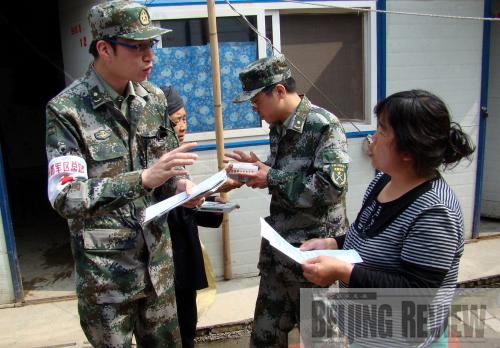|
 |
|
LET US HELP: A military psychological consultation team helps Beichuan County residents in May (YANG HUANHUAN) |
A year has passed since the May 12, 2008, 8.0-magnitude earthquake ravaged southwest China's Sichuan Province. While many are paying attention to the rebuilding of infrastructure in the quake-hit areas, few have noticed that a more urgent need lies in rebuilding the psyches of those families that were broken apart on that deadly day.
One bit of news coming out of the area on April 20, 2009, brought that task into sharp focus, saddening all who read about it. A 33-year-old man from Beichuan, a county that was devastated by the quake, committed suicide in the wee hours of morning. The story stood out from other suicides because the man, named Feng Xiang, was a Beichuan official. What's more, Feng was not the first official in the earthquake zone to take his own life. Before Feng, another official named Dong Yufei chose the same end last October.
The similarities between the two men do not end there-both victims lost their sons to the earthquake and both worked long hours of rescue and recovery in the aftermath while enduring the grief of bereavement.
The death of the two men has drawn attention to the mental health of local officials in the quake-hit areas. According to media reports, the major reasons Feng and Dong committed suicide were the anguish caused by the loss of their sons and the stress of high-intensity work.
Feng's brother told the The Beijing News that Feng was the deputy director of the Publicity Department of the Beichuan Committee of the Communist Party of China. After the devastating earthquake, Feng was in charge of communicating basic county information to visitors. He once told his brother that it deeply distressed him to relay the story of collapsing buildings and the deadly consequences.
But Feng's most crushing pain was the loss of his 8-year-old son. At one point, he considered having another child, but the busy days provided no opportunity to plan for a future.
Guangzhou Daily reported that at least 400 of Beichuan's officials are suffering the grief caused by the breakup of families. For those couples that survived, the husband and wife were often forced to live apart, as Beichuan officials had to work in remote temporary offices located in other counties.
One Beichuan official told the Guangzhou-based Southern Weekend newspaper that most officials in the county now work without complaint out of a sense of duty and responsibility; money, honors and promotions have become meaningless as motivators.
After the disaster, many local officials worked seven days a week, gave up their normal family lives, had no fixed time to eat or sleep, and worked while afflicted with the pain of diseases over long stretches of time.
| 